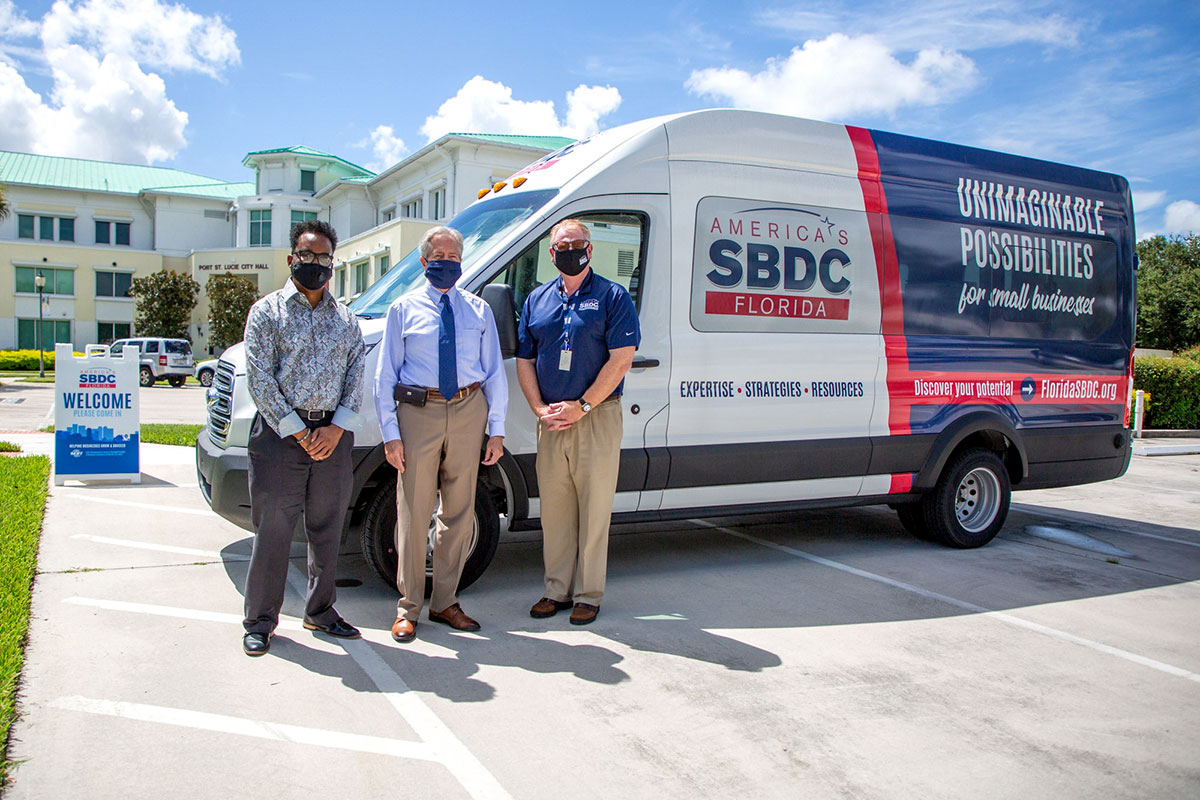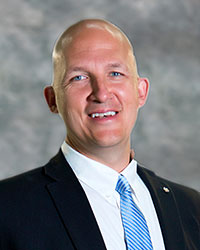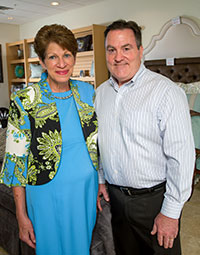Unique partnership helps small Port St. Lucie businesses cope

City council and development center at IRSC offer advice, classes and tools to ease financial losses
BY ANTHONY WESTBURY
The impact of the coronavirus pandemic on America has been immense — almost 400,000 deaths as of January and the economic fallout from shuttered businesses has ranged from layoffs to bankruptcies.
In May, the Census Small Business Pulse Survey revealed the damage done by COVID-19 to this disproportionate percentage of the economy. Businesses that employ fewer than 500 people make up 44% of the total U.S. workforce. The survey showed it will take more than six months for most small businesses to return to normalcy — even if they survive the pandemic.
Of 100,000 businesses surveyed, 83.5% reported negative effects from the pandemic. Of those, 41.4% temporarily closed at least one location for at least one day and nearly 45% reported serious disruptions in their supply chain.
Fortune magazine reported in September that more than 100,000 small businesses had permanently shut down during the first nine months of the pandemic. A variety of other reports estimated that between 800 and 1,500 small businesses a day were failing. Anecdotally at least, those trends are reflected on the Treasure Coast.
Yet one state-funded entity and a local council in St. Lucie County have acted in concert to stop the rot and try to build back the small business sector through enhanced training and business advice services to entrepreneurs.
IN EXISTENCE FOR 12 YEARS

The Florida Small Business Development Center at Indian River State College has been active in assisting small businesses prosper and grow for a number of years.
Specifically, according to director Tom Kindred, the SBDC’s credentialed business consulting programs have been available to small business owners for more than 12 years, offering a range of consultancy services: designing and developing business plans; advice on innovative and established marketing techniques; financing and other aspects of the nuts and bolts of running a successful small business.
At the same time, Kindred noted, Port St. Lucie has been growing at an unprecedented rate. The city population has soared to more than 200,000; it is the seventh-largest city in Florida, and the third-largest in South Florida.
Yet, SBDC was serving Port St. Lucie with only a part-time consultant, Michael Bernard, who headed up a range of classes and workshops intended to help small businesses do better.
It was the COVID-19 crisis that prompted the Port St. Lucie City Council to up its game with small businesses, City Manager Russ Blackburn said.
In May, the council and the FSBDC at IRSC entered into an interlocal agreement to offer small business consulting services in response to the disastrous effect of the COVID-19 virus.
The city council, business navigator Elijah Wooten noted, approved funding Bernard as a full-time consultant to expand work that had been going on since 2019.
Prior to the agreement, the center conducted the Port St. Lucie Business Accelerator program, a 10-week course offered at IRSC’s Pruitt campus in St. Lucie West. The initial course had been offered in spring 2019.
PROGRAM FUNDED BY GRANTS
To date, Wooten reported, there have been three Business Accelerator Program courses completed, encompassing 79 companies. Of these, 45 completed all the courses. The city offers a $5,000 reimbursement grant to eligible companies that complete the program. This is funded through the city’s Community Block Grant program and with a matching grant from CenterState Bank. The grant is designed to reimburse business owners for costs of marketing/advertising, employee training, professional services and the purchase of supplies and inventory.
Port St. Lucie Mayor Greg Oravec believes this assistance is vital to the survival of the city’s small businesses and to Port St. Lucie’s future growth and vitality.
“Supporting our business community through this and other programs is a foundational element of our strategic goal to foster a diverse economy and employment opportunities; and this strategic goal is, in turn, one of the foundational seven goals of our strategic plan,” the mayor said.
“Simply stated, we want to help our citizens bring their dreams of starting their own businesses to life, and we want to help their businesses grow to their full potential in our safe, beautiful and prosperous city for all people.”
Ever since the loss of several biotech companies during the recession of the mid-2000s, the city has concentrated its economic growth efforts on growing and nurturing new and existing small businesses in the city.
“Since Port St. Lucie is a rapidly growing metropolitan marketplace,” Kindred explained, “I had the idea that the city probably warranted having a full-time consultant rather than the part-time service we had been offering. So, we came up with an idea to approach the city about a partnership.
“We are a grant-based program with limited funding, but I felt we could leverage our limited funding by working with the city to help its small businesses.” The May agreement with the city runs for three years and it “ups our game,” Kindred said.
BETTER CHANCE FOR SUCCESS
While the small business training process was already in place and that COVID slowed that process down, Kindred said, others see the pandemic as an accelerant in offering small business owners more help.
Blackburn recalled that “we started this at the beginning of COVID. Many of our small businesses were severely impacted. But it’s been a very uneven recession; some businesses were [and are] really hurting, others are enjoying unprecedented sales.”
Blackburn emphasized the tremendous impact of small businesses in the city.
“In 2016-2017, Port St. Lucie had more new businesses formed than anywhere else in the U.S.,” he said.
Yet many of them encounter hurdles to prosperity, even in good economic conditions.
“Many begin with [an owner’s] passion,” Blackburn noted, “yet they need some sort of business plan. The expansion of the SBDC services in the city recognizes we have a growing small-business base in a growing community. They are helping us offer a better chance of success, especially in the time of COVID. [The federal Paycheck Protection Program] helped, but having someone available to hold their hands has really made the difference.
“We’re at more than 200,000 now,” Blackburn continued. “I’m not sure of the exact number of small businesses in the city, but it’s certainly in the thousands. So, we need to help them succeed. We had been talking to Tom [Kindred] about offering more services to do that, but it was COVID that gave the push to make the city council say yes more easily.”
While some Port St. Lucie small businesses have been hit hard by the pandemic, others have actually thrived.

NEW WAYS OF DOING THINGS
David Dow of Dow Decorating, which has a showroom at 1489 St. Lucie West Blvd., near the Publix shopping plaza, has been in business in the city for a little more than two years. Yet the interior design company boasts a prior 30-year-plus history in Connecticut.
After closing their doors at the start of the pandemic and keeping their fingers crossed they’d survive, Dow and his wife, Kathy, realized they were designated an essential business and could reopen.
“We’d been working with [SBDC consultant] Michael Bernard,” Dow said, “and we attended the Business Accelerator Program classes. A lot of it was like a refresher course for us, since we’d been in business so long, but it taught us a lot about getting started in Florida. We also learned a lot about new digital marketing techniques that was very useful. We’ve learned to use a combination of digital marketing through our website and more traditional newspaper and magazine ads.”
The results have been impressive. Dow said his sales have almost doubled year over year and, in fact, the company recorded its best sales figures ever. Dow believes the pandemic actually helped his business because customers were restricted to their homes and began to want to complete a lot of home improvement projects.
“But we did learn a lot about how to market ourselves using Google searches online,” Dow said. “We now have more than 50 five-star Google reviews. Before last year I wouldn’t have known how important that would be!”

ASSISTANCE INVALUABLE
Matt Black, owner of a Benjamin Franklin Plumbing franchise that covers Port St. Lucie and Jupiter, has had mixed results because of the pandemic.
He also worked closely with Bernard before buying the company in March. Black had been manager of the business for 20 years, but wanted advice on evaluating its financials before he invested his savings into the business.
“It was priceless to have that knowledge [through SBDC],” he said. “They were very willing to schedule multiple consultants and provide a variety of financial scenarios. I was very impressed by the depth of analysis they performed. Our business plan was dissected, as was our balance sheet. We saw where the company was at and whether we could sustain it.”
And then, within weeks of signing a lease, COVID came calling.
“It was pretty drastic at first,” Black said. “Lots of calls were canceled, maintenance agreements postponed or canceled. We were getting only emergency calls. But it picked up some by the end of the year and it’s definitely getting better.
“I can’t compare year over year because I’m a new owner, but I think we’re going in the right direction. The assistance we received from the SBDC and the Small Business Administration was invaluable.”
The partnership between the city and SBDC continues to evolve and strengthen.
Going forward, the two parties are refining their strategies. They want to increase community engagement in the navigator program classes, to hire a capital access specialist at SBDC. They plan to offer more classes for manufacturing companies, to collaborate with the City of Port St. Lucie’s business tax supervisor on how to start a business.
Ahead is the creation of a detailed action plan concentrating on retail and hospitality, manufacturing, biotech [government contracting] and home-based business assistance. SBDC and the city hope to recruit banks to educate entrepreneurs in profit mastering sessions. The overall goal is to build the city’s business base.
There’s obviously a lot more work to be done before business conditions return to pre-COVID levels. Yet this cooperative SBDC bodes well for small businesses in Port St. Lucie, a place that values the vital contribution they make to the city’s continued prosperity.
